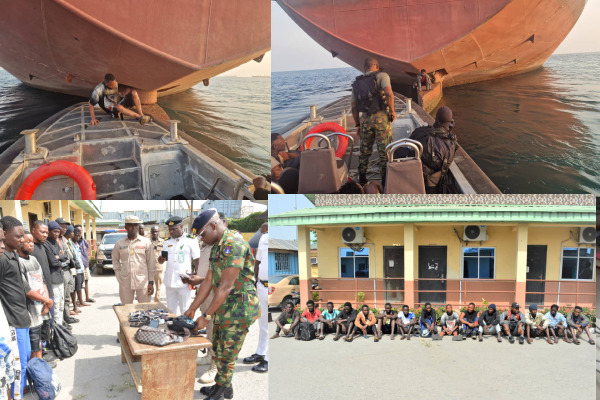
The Nigerian Navy arrested at least 21 suspected stowaways between January and March 2025. Maritime stakeholders have linked the rising cases to poor port security and the country’s worsening economic situation.
The figure, confirmed by Lieutenant Hussaini Ibrahim, spokesperson for the Nigerian Navy Ship BEECROFT, represents almost a third of the 67 stowaways intercepted in the whole of 2024
The outgone Commander of NNS BEECROFT, Commodore Rafiu Oladejo, during his send-off parade on April 1, 2025, emphasized the Navy’s ongoing commitment to combating maritime crimes, particularly stowaways. Commodore Oladejo noted that the interception of 67 stowaways in 2024 demonstrated the Navy’s unwavering efforts to curb illegal migration and other maritime threats.
But, on January 17, 2025, NNS BEECROFT intercepted eight stowaways aboard the commercial vessel MSC KATYANI, which was en route to international waters. The suspects were attempting to illegally migrate to Europe by hiding aboard the vessel, which had docked off the coast of Lagos.
The stowaways were promptly detained and handed over to the Nigerian Immigration Service (NIS) at the Lagos Ports/Marine Command in Apapa, Lagos. Deputy Superintendent of Immigration, Dalhatu Musa, confirmed the transfer of the detainees.
Just about two months later, on March 30, 2025, NNS BEECROFT again intercepted another 13 stowaways aboard MT SEAWAY CITRON, at about 12 nautical miles off the coast of Lagos near the Fairway buoy. The stowaways consisting of 12 Nigerians and 1 Burkinabé national, were apprehended while attempting to board the foreign-bound vessel. The arrested individuals were handed over to the Nigerian Immigration Service in a transfer that took place on April 2, 2025.
According to Lieutenant Hussaini Ibrahim, the Navy has been working closely with immigration officials to curb the growing issue of stowaways attempting to leave the country through illegal maritime routes. Lieutenant Ibrahim also revealed that some arrests were not officially recorded, as they were handed directly to immigration authorities for further processing.
“The Navy has made significant strides in addressing illegal migration by sea, but we have also worked with the Nigerian Immigration Service to ensure that suspects are properly documented and processed for legal action. While not all arrests may be publicly recorded, we continue to collaborate with immigration officials to handle such cases.” Lieutenant Ibrahim told our correspondent.
Speaking last week, the immediate past Chairman, Institute of Chartered Ship Brokers (ICS), Dr. Chris Ebare acknowledged that the rising incidence of stowaway cases in Nigeria is largely driven by economic hardship, youth unemployment, and the high cost of legal migration,
Dr Ebare noted that the government is making efforts, particularly in the area of job creation, but stressed that much more needs to be done to address the root causes of irregular migration. He pointed out that stowaway cases are not unique to Nigeria, but current trends reflect a shift from past methods of irregular migration.
Reacting to recent arrests of stowaways by the Nigerian Navy, the former ICS Chairman emphasized the need for continuous vigilance by security agencies to curb the trend. “To be honest with you, the security agencies must continue to monitor and remain vigilant in stopping these desperate acts,” he said.
“Many of them feel this country has nothing to offer, and they just want to get out — even if it means earning a dollar a month abroad. In those days, these same youth used to travel to Libya through the road by entering vehicles. But now, road migration is too expensive and extremely dangerous due to tight security checks and growing insecurity, including banditry.” Ebare concluded
Also speaking with Shipping Position Daily last week, Chairman, Nigerian Merchant Navy Shipping, Zonal Council, Captain Adetayo Saliu raised concerns over the lapses in port security, particularly those under the purview of the Nigerian Ports Authority (NPA).
Capt. Saliu confirmed that many of the recent stowaways arrested by the Nigerian Navy boarded vessels directly from Nigerian ports, not offshore, suggesting a significant breach in the port’s internal security. He further called for a thorough audit of the NPA’s security framework and stricter scrutiny of dockworkers, including gangway men and other maritime personnel who operate within port terminals.
While clarifying that the Marine Police primarily operate on water and have limited influence within port terminals, Capt. Saliu emphasized that the responsibility for such breaches rests squarely with port authorities and associated ground personnel.
The Merchant Navy Chief revealed that such cases are not always reported to all relevant authorities, noting that neither he nor his team at the Merchant Navy had received reports on recent stowaway incidents.
He alleged that: “Many of them are Nigerians and they were arrested right in our ports. That means they boarded the ships while the vessels were docked. For someone to successfully hide onboard a ship, it means there was a lee way and someone within the port environment likely allowed it. That clearly points to a failure in the NPA’s security structure. Dockworkers and gangway men are assigned to monitor activities onboard ships. They should have noticed unusual movements. If they didn’t, then we have a gap that needs to be addressed urgently.”
“It is mainly the duty of the NPA and those who work directly within the port. The Marine Police are out on the water; this happened within the land-based port environment. It’s not a big deal if the right systems are in place. But once the port’s security network is stretched thin, it becomes vulnerable. That’s where the problem lies.” Captain Saliu stressed.















